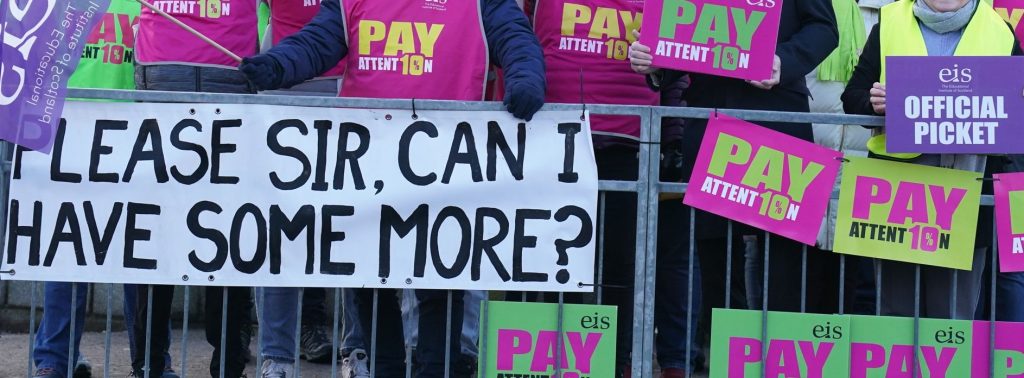«The government is using backdoor strategies to undermine the strikes» claims Sally [fictional name], a Yorkshire-based Elementary school teacher and SENCo (Special Educational Needs Co-ordinator), also with responsibility for Pupil Premium and Mental Health and Wellbeing. She’s one of those people who accepted to speak up on the strike that loads of teachers are joining in the United Kingdom since the 1st February 2023, in order to ask Rishi Sunak Government to both increase their wages and diminish the excessive workload.
The reasons of striking in the UK
On the surface, if this strike is about pay, the teachers who are striking are more concerned about the state of the education system and the extreme lack of budget. In addition, the workload and pressures are increasing with more Government expectations and raising of the bar in terms of COVID catch up, the disadvantaged gap and attainment.
«In my school alone, this year we have had one very experienced teacher taking early retirement at Christmas (because she had had enough of the pressures), one new teacher going back to his old job as a car salesman as he didn’t realise (and couldn’t cope with) the extreme demands of the job, and one teacher (four years qualified) resigning to take a job as a teaching assistant, as he was being made ill, stressed and depressed by the teaching demands» Sally tells.
Amongst the unions that have joined the strike, the NEU (National Education Union) and the NASUWT – The Teachers’ Union. Although the strike is spreading across the country like wildfire, both Scotland and Wales are negotiating separately to the English unions.

Despite she has enrolled in the NAHT (National Association of Head Teachers), Sally has decided not to join the strike as «the country does not have an infinite pot of money and so demanding more pay seems inappropriate. I would personally rather see more money put into the public sector in all areas, without teacher pay rises, as that would seem to be the best solution for our current broken system».
Vital services’ current situation
Wider than just in schools, which have suffered cuts in the economic resources available to them, the current number of teachers and support staff is insufficient to manage the growing needs and the knock-on effects of the spillover on other public services, which are also completely overwhelmed. In the last ten years, George Osborne’s Conservative Party austerity policies have reduced in real terms public sector spending. Both Covid-19 and Brexit have also had an impact on the spending and cuts.
According to the latest NEU’s poll, 44% of England’s state-school teachers plan to quit by 2027. Half of those (22%) intend to leave within two years. The main reasons why teachers are quitting their job, both stress and the unmanageable workload have worsened the situation since the start of the pandemic.
Cuts in the education system are not as recent as they seem to be in the UK, but «the respect for teachers has been eroded for decades, dating from when Margaret Thatcher built a ‘consumer’ model for public services – moving away from being ‘citizens’ to being ‘consumers’. The public generally seem to think they know our job and do not have any idea of what it actually entails, but have little sympathy» Sally comments disheartened.
Not only do they hit schools, but Government cuts and lack of spending also affect vital services such as social care and NHS (National Health System). This means that a lot of those needs fall back onto schools, that have to get on and support both the children and their families as best they can. «Special needs assessments, speech and language advice, counselling and wellbeing services all have waiting lists of at least a year maybe two, so in the meantime schools need to fill those gaps» explains the Yorkshire-based teacher.
The answer of the British Government
Sally also added that «the Government response seems to be to say how cruel teachers are for depriving children of their education – and how they are inconveniencing parents/carers who need to work – playing on the concept of ‘keyworkers’ needing to be able to do their jobs so needing childcare».
Amongst those backdoor strategies that the Government carried out in order to discourage the strike, Sally mentions the one according to «the Government has issued instructions to head teachers to have disadvantaged children and keyworker children in school as a priority, thus undermining teachers who are striking, as those children in their class would need to be taught by another teacher».
Another strategy establishes that «all children who receive free school meals must be fed – and this can’t be done through providing packed lunches delivered to them off site, as Natasha’s Law states that any packed lunches need to be fully labelled and tailored to children’s dietary needs, so the kitchen staff need at least a month’s notice to provide these» adds Sally.
Different circumstances, same outcome: overcrowded schools and lack of staff who should manage the children. Despite seven days of national strike have been scheduled in February and March, NEU has declared that schools will only be affected by four of the days. In addition to the strike occurred on the 1st and 14th February, teachers will protest again on the 15th and 16th March 2023.
Read more: Spare, Prince Harry’s biography: comparing two points of view

